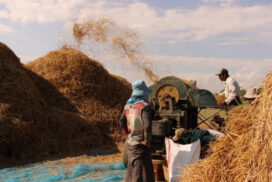The price of sesame seeds rebounded in Mandalay markets on the back of strong demand by foreign trade partners.
On 1 January 2023, the prices of sesame hit K140,000 per 45-viss bag of Niger seed, K220,000 per bag of brown sesame, K265,000 per bag of white sesame, K210,000 per viss of winter sesame and K265,000 per bag of black sesame (Samone variety). The prices climbed to K150,000 for Niger seed, K235,000 for brown sesame, K295,000 for white sesame, K245,000 per bag of winter sesame and K305,000 for black sesame on 20 January 2023. The figures indicated a sharp increase of K10,000 to 40,000 per bag in the past three weeks depending on different varieties.
Although the volume of sesame supply to Mandalay commodity depot is still low, the reopening of some border posts made the trade activity alive. Moreover, those traders are also buying them to fill the inventory.
Myanmar’s sesame seeds are primarily sent to China through the border posts.
On 30 June 2022, the Foreign Exchange Supervisory Committee (FESC) notified traders of transactions for the exports of agricultural products including corn, rice, beans and pulses to be made in dollars instead of Yuan-Kyat/Baht-Kyat direct payment for border trade settlement.
Therefore, export earnings of the beans and pulses have to be exchanged for the US dollar according to the reference rate of the Central Bank of Myanmar (K2,100). At present, the exchange rate against the US dollar over-the-counter market is around K2,850. Nonetheless, there is a large gap between the regulated rate and the unauthorized rate of the US dollar. As a result of this, it affected exports of agricultural products, traders said.
According to a meeting (66/2022) of Foreign Exchange Supervisory Committee, export earnings of some items can be made in Chinese Yuan and Thai Baht in addition to the US dollar.
The CBM’s notice dated 18 November takes effect on those export items; various pulses (green gram, black gram, chickpea, pigeon pea), edible oil crops (peanut, sesame seeds), corn, rubber, fishery products (fish, shrimp, crab, eel) and livestock products (live cattle, hides, frozen meat, dried meat).
The traders need to apply for a licence to make Yuan or Baht payments. As per the US dollar policy, 65 per cent of earnings must be exchanged to local currency at the CBM’s reference foreign exchange rate, while exporters can use 35 per cent of export earnings or transfer or sell them to Authorized Dealers or others with an over-the-counter rate within 30 days.
Last April, the world’s top palm oil exporter Indonesia, which is one of the main oil suppliers to Myanmar, declared an export ban on cooking oil export to reduce the domestic shortage. Consequently, Myanmar’s Trade Department under the Ministry of Commerce temporarily suspended exports of oil crops (peanut and sesame) from 9 May to have oil self-sufficiency. Exports of Myanmar’s edible oil crops resumed as the world’s top palm oil exporters returned to normalcy, according to a notification dated 5 July 2022 released by the Trade Department. — NN/EMM
Foreign demand drives sesame prices up
- January 22, 2023
- 680














